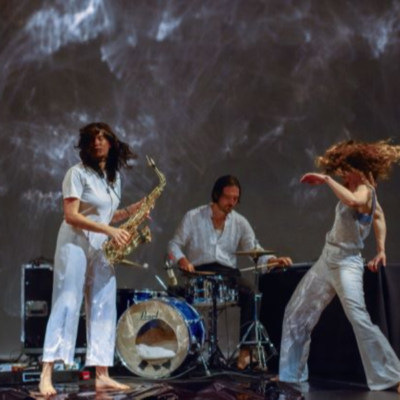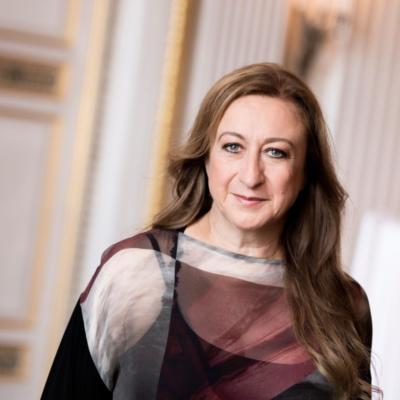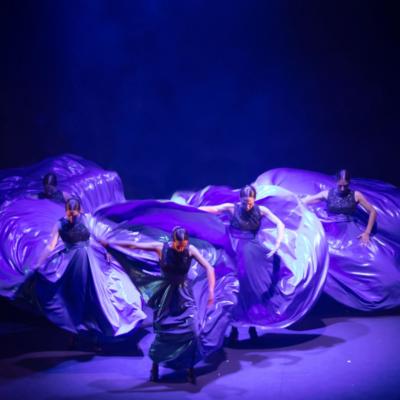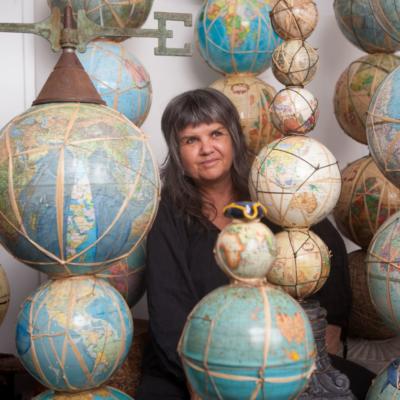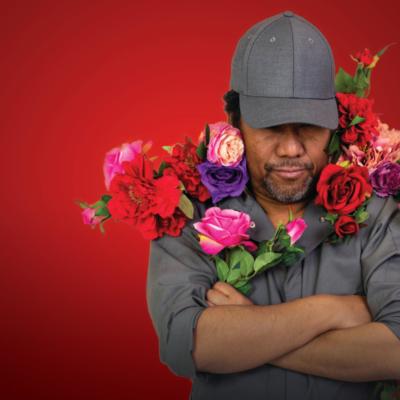Elegant and elaborate and erudite. A tapestry of music, and words and cloth.
Woven Song billed as a unique collaboration across cultures and art forms featuring new musical compositions by Yorta Yorta and Yuin soprano Deborah Cheetham AO was extraordinary, entertaining, and enlightening. On stage the band of musicians was vast and varied, and fluidly move from song to song through the night. Members of the Sydney Symphony Orchestra and Melbourne Symphony Orchestra (in the Plexus Collective) were both on the City Recital Hall stage, and who else but this professor of music could manage to get both rival cities performing together.
In 2019 Deborah Cheetham established the One Day in January project designed to develop and nurture Indigenous orchestral musicians. It's heart touching and inspirational to also meet five of the talented 2023 One Day In January Scholars on stage: Joy Blurton, Arieta Fergie, Sandra Hart, Djamari Hunter and Kallarah Silva.
There were also members of indigenous Ensemble Dutala, Australia’s first Aboriginal and Torres Strait Islander chamber ensemble. And a bunch of guest artists, mezzo-soprano Linda Barcan, tenor Matthew Reardon, baritone Stephen Grant are allotted songsters during the evening, Stefan Cassomenos is on piano plus we are introduced to two less usual instruments.
The title Woven Song is apt. Not only for the tapestries that inspire the compositions, but also for the way that as a program all the music was woven together. The pieces - Long Time Living Here, Catching Breath, Above Knowing, Gulaga, Ngarrgooroon, Pukumani, My Mother's Country - are varied in style yet connected by intention.
Each piece presented an artwork, a tapestry, and the story behind them that inspired the music. Catching Breath as example by weavers Chris Cochius, Pamela Joyce and Milena Paplinska, is based on the portrait of a young warrior by artist Brook Andrew based on an unnamed Aboriginal warrior from a 1900 photograph. We are only beginning to understand that there is still so much history to uncover.
Beside me, my friend most enjoyed Pukumani. And it is in that piece that we are introduced musically to guest artist Mindy Meng Wang on the Guzheng. But it was the final piece with guest artist Anne Norman on the Shakuhachi that nudge ahead musically for me as a superb culmination of a cultural yet complex night. From Google research in the foyer before the performance, I discover that the shakuhachi flute is used as a tool for Zen Buddhist meditation as well as playing classical, jazz & traditional Japanese folk music. And there was definitely a sacred aspect to many of the pieces, and to the stories, yet through the use of this instrument it resounded for me more strongly in the last.
Have you ever read a poem in its original language instead of its translation? This program Woven Song started in English lyrics yet it wasn't long before we were introduced to language, each language meaningful to the piece and the tapestry that has inspired the song. From here and from other places, I am reminded of the importance of using language. Language that never should have been lost. Those words were unknown to me, yet the meaning was stronger, even more powerful through their use.
The inspirations, and stories were explained to us before each song via the large video screen behind the stage. Deborah Cheetham delivered duality by gifting us both an intellectual and emotional stance for each piece. Then the audience received the extra prize as she changed evening gowns for each number. Woven Song took on an additional layer of cloth.
Musically the compositions of Deborah Cheetham are extraordinary and diverse. Including those presented here in Woven Song.
"Deborah describes herself as a 21st century urban woman who is Yorta Yorta by birth, stolen generation by government policy, soprano by diligence, composer by necessity and lesbian by practice."
Personally for me, the most heart touching moment of the night was the story of Gulaga. Deborah told us of a visit to the Sapphire Coast before she was a singer, when she was a 15 year old flautist on a school music trip. The blue of the Yuin Country ocean mesmerised her. She dreamt of it for 35 years and a mountain behind the ocean. Only later when she found out that she is also from that Country, did Deborah realise the Sacred Gulaga (Mount Dromedary) had been calling her. was calling her. I know that mountain. Perhaps it was the combination of knowing Gulaga her speaking to me the first time we met, telling me she was a sacred women's site, that added such profound magnitude to the connection of this story and that song in my heart.
25 January 1788 was the last date that Australian Aborigines retained self-determination Deborah Cheetham at one point reminded us. So, this deeply moving music and video presentation of stories was particularly poignant set on this date.
Thank you Deborah Cheetham, and all the instrumentalists, singers and creatives. Thank you to the stories behind the performance. It was a privilege to spend an evening with you.
Performed at City Recital Hall Sydney as part of Sydney Festival 2023, presented by Short Black Opera in partnership with Sydney Symphony Orchestra and CRH Presents.
